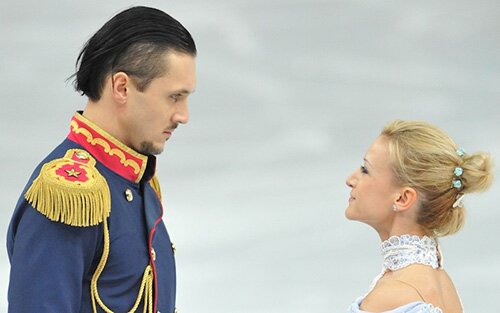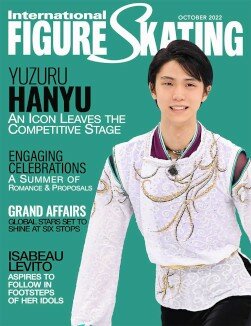
Four years after their Olympic triumph in Sochi, Tatiana Volosozhar and Maxim Trankov of Russia have settled into a new life as parents, show performers, and most recently, he as a coach.
The Russian pairs team were in PyeongChang last February to watch Aljona Savchenko and Bruno Massot succeed them on the Olympic throne. Trankov was commentating for Russian television and Volosozhar attended as a spectator. It was a new experience for both, but especially for her.
“I looked at the Games in a completely different way,” Volosozhar said. “It’s great that I had the opportunity to see it all live. It was incredibly interesting for me. I woke up in the morning and thought, ‘great, now I will have a shower, then go to breakfast, and go to the rink and just enjoy watching how everyone is competing at the Olympic Games.’ I was so comfortable in that moment. I felt I already finished my story in the sport. This was the time when I set the final point and knew I did not want to compete anymore. I don’t have the desire or the motivation.”
Volosozhar and Trankov never officially announced their retirement. “We just didn’t make it big news because I think it was already quite clear and obvious to everyone so it would have been a bit late to make a big announcement that we retired,” Trankov said. “We didn’t announce it officially, but we have said goodbye to figure skating as competitors.”
Watching the Olympic Winter Games from a commentator’s perspective was not a new experience for Trankov. “I already got used to reporting on events and not competing,” he said. “The only nerve-wracking moment was when I was watching our team and rooting for them, especially since their preparation for the Olympic Games had been so difficult, not knowing if they could go or not.”
Trankov was cheering hardest for his fellow pairs skaters and said he felt for Evgenia Tarasova and Vladimir Morozov, who slipped from second to fourth in the individual event after making errors in the free skate. “I think that Zhenia and Vova were unlucky with the starting number,” said Trankov. “To skate last in your first Olympic Games is tough. I think they were lacking experience. In the short program (where they also skated last) there is less waiting time. Also, they were second after the short, which meant additional pressure. It is just a game of nerves that the kids lost.”
THEATRICAL MOVE
After welcoming their daughter Anjelika in February 2017, Volosozhar and Trankov were eager to return to the ice that summer. They performed in Ilia Averbukh’s successful ice musical “Romeo and Juliet,” he in the role of the prince and she the princess of Verona. “We are grateful to Ilia that he gave us this chance to come back to the ice, which I wanted after giving birth,” Volosozhar said.
“I got back into shape in the beginning of the summer at our home in the Iceberg Palace in Sochi — as we call it since the Olympic Games. Obviously, it was hard at the beginning, as my body was working in a very different way. However, I got back into shape and we even thought about competing again. But after skating for three months we felt we would continue our career most likely as professionals rather than as amateurs.
“We were ready to move on. Life continues and will be connected to figure skating, but a lot of doors opened for us in life outside figure skating.”
Initially, there were no offers for the double Olympic champions to perform in shows, as producers did not expect them to come back so quickly after having a baby. But Averbukh did not hesitate to reach out the them and Volosozhar and Trankov embraced the opportunity.
Averbukh’s production is not your typical skating show, in which everyone performs their routine with perhaps an opening group number or finale. In this ice musical, figure skaters, ballet dancers and singers perform on and off the ice.
The skaters also have to show their acting skills and some such as Trankov and Maxim Marinin (portraying Romeo), Alexei Yagudin (as Mercutio) and Roman Kostomarov (as Tybalt), took fencing lessons.
It was a new concept for Volosozhar and Trankov. “The difficulty for us was that we never took part in that kind of show, or to play roles and be part of a mechanism where you have to interact with other participants,” Trankov explained. “It’s not just an ice show, it is a theatre performance, a musical, and so we had to turn our athletic skills into acting a bit. This was also quite difficult at the beginning. It means a bigger responsibility. In an ice show, the two of us are skating, but here we go onto the ice and there are 20 or even 30 people out there as well.”
Volosozhar felt the group numbers were the hardest for them to learn and to blend in with the others, but they are enjoying the experience. “It is very interesting to skate with Olympic and World champions from past years,” said Trankov. “We’re pushing each other not to relax and to perform elements of high difficulty. It is a new challenge that we accepted. Ilia said we’ve fulfilled it honorably.”
“The other guys are very experienced. They’ve been performing in these shows for 10 or 15 years and they took part in TV projects,” Volosozhar added. “We can learn from them in the group numbers. Obviously, it is very interesting and we’re ready to continue to perform like this.”
COACHING CALL
The musical is just one thing that keeps the couple busy. While Volosozhar is focusing on being a mother and management studies, Trankov has begun a career as a television host and commentator. “First, I started just commentating on figure skating events and judging by the reactions, it worked quite well,” he said. The producer and the co-commentator were happy. At first they just invited me when Tatiana Tarasova wasn’t available and then I was commentating on basically all competitions on TV.”
Viewers appreciate Trankov’s honest and compassionate style of commentating. The producers recognized his talent and suggested he take classes to become a professional and also to do other television work. Trankov is now studying at the Moscow School of Television and Radio. “I take classes like culture of speech and other professional skills that the TV network felt I needed to improve. So I have my studies, work on TV and perform with Tania in ice shows.”
Television work suits Trankov. He finds it interesting and enjoys meeting new people he can converse with. “I’m a communicative person and for me this is very important in life because you learn something new from each new person and you develop further. The work on TV allows me to do that.”
Trankov also took part in Averbukh’s latest made-for-TV show “Ice Age Children,” in which 2006 Olympic ice dance champions Tatiana Navka and Kostomarov, Trankov and Averbukh taught a team of children. The youngsters, aged eight to 12, performed various skating routines and a vote decided who stayed and who was eliminated from the competition.
When Nina Mozer, the head coach at the school where Tarasova and Morozov trained, announced following the Olympic Games that she would be taking some time off, the skaters looked for another solution. Since Robin Szolkowy, who had been working with Tarasova and Morozov the past four years, is not based in Russia and cannot permanently coach them, Trankov took on the job as their new coach. “Maxim’s life has turned upside down and then figure skating was added to it again,” Volosozhar said with a laugh.
“Robin was only coming before competitions to help them and they needed more of his presence,” Trankov said. “There was a suggestion to move to another country, to North America, but they didn’t want that and they turned to me for help. I told them I had to think about it and consult with Tatiana because I did already a lot in my life. We have a daughter and I somehow need to earn money and as a coach in Russia you can’t earn much. It is not a very rewarding task.”
This caused him to initially hesitate to accept the job. After the 2014 Olympics, Trankov was interested in coaching and eager to work with Tarasova and Morozov, but Mozer decided to bring Szolkowy onto her team. “I was a bit upset because back then they just had moved up to seniors (2014-2015 season) and I did two programs for them,” Trankov said.
“They won bronze in their debut at Europeans and came sixth at Worlds, which was a very good result for former juniors. However, together with Nina they decided it was better for them to work with Robin than with me. And now they came to me. When I wanted to coach them and was ready for it they didn’t need me, and now when I don’t need them anymore, they want me.”
Volosozhar wanted him to try it and eventually he was persuaded. Trankov agreed mainly because he sees it as an interesting challenge and realized he could not decline the opportunity. Tarasova and Morozov are his friends and Trankov did not see other coaching options for them in Russia.
“We either have coaches that are just starting and are working successfully with juniors, but Tarasova and Morozov don’t trust them for seniors. Or, there are others like Tamara Moskvina and Oleg Vasiliev who haven’t had any major results in a while. So they were weighing their options for a long time. They had experience working with me and they liked it back then and therefore they chose me.”
With Trankov performing in the ice show all summer, his skaters will follow him wherever he goes. In fall and winter, Volosozhar might partner with another skater when her husband has to go to competitions with Tarasova and Morozov. Nevertheless, she supports his decision to coach. “It’s good to try this different direction because Maxim and I are not planning to skate in shows for the next 20 years, but would still like to be connected to figure skating,” Volosozhar said.
Trankov, however, is not in total agreement with that thought. “Tania wants that, but honestly I’m not so keen. I wanted to run away from figure skating, even from shows and everything for a long time because I don’t like skating, being stressed out, and having to go to training every day. I never liked it and I don’t like it now. I never was a fan of figure skating and that is not a secret.”
Now he is on the ice for the first half of each day as a coach, and in the evening he practices with Volosozhar and performs in the show. “I thought after I won the Olympic title that I’ll never have to skate that much again and that would be great, but it turned out that I’m skating even more,” he said with a laugh. “So, that’s my life now. I’m on the ice all the time and unfortunately, I almost don’t see my daughter. We miss each other and we see each other only in the morning or during a break. I’m trying to rush home to see her and to play with her.”
Volosozhar also has no plans to become a full-time coach. “Like Maxim, I don’t want to be on the ice all day, although I really love figure skating — ever since I was a child and started skating. “But, now I enjoy spending time with my daughter and I think the mother or one parent should always be with the child to watch her grow up and to help her grow up in the way you want and not like the nanny or even the grandmothers do.”
However, she said she is open to assisting her husband if he remains involved in coaching in the future. Right now, that is not his plan. “I’m just coaching Tarasova and Morozov. As soon as the Russian Figure Skating Federation officially announced that they would skate with me, of course I got calls from other teams, but I declined and I’m officially stating that I’m coaching just one team. For now, we agreed on one year and well see if we continue to work together. If it doesn’t work out, the guys still have three years to prepare for the Olympic Games with another expert.
“So, it’s for one year now, but obviously, if everything will be fine, I’ll go to my fourth Olympic Games as a coach. After the project with Tarasova and Morozov, I am not planning to continue coaching. At this point, that’s a taboo for me.”
FAMILY AFFAIRS
And what about their daughter Anjelika, who is now one and a half years old? “Of course, she’ll learn to skate,” Trankov said firmly. “She’ll ask at one point when she sees mom and dad skating on the ice.”
“Or when she sees some show she’ll probably say that she wants to try it and to be like mom and dad,” Volosozhar added.
However, the couple is not too keen on the idea of having her follow in their footsteps and become a top-level athlete. Trankov feels the competition in ladies singles is too tough in Russia and Volosozhar doesn’t want their daughter to become a pairs skater.
“I never want my daughter to do pairs. Only if she says it’s working for me and if I see that she likes it, is suited for it and wants to do it, then I’ll help her. But basically, I want to shield her from pairs skating as much as I can because it is a sport with a high risk of injury.”
Trankov said their daughter is already an active, athletic child. “Since she was four months old she was crawling so we think she is suited for sports,” he said. “But we don’t know how she will grow — if she will be tall, taking after me or if she will be small like Tania.”
As if all their projects and jobs were not enough, Volosozhar and Trankov were working on a book that came out at the end of August in Russia. Volosozhar said they published the book, “Two Sides of One Medal,” in order to “talk about our path in the sport, to warn of mistakes and to support those who are starting out and who have doubts. I hope that someone gets inspired to do sports after reading our story.”





